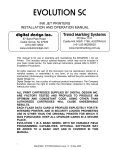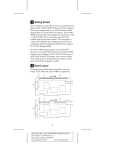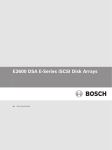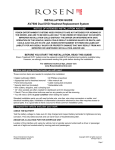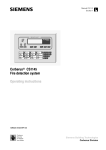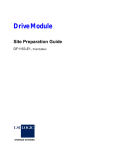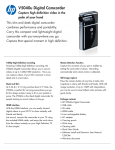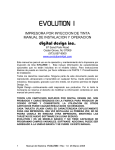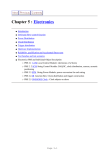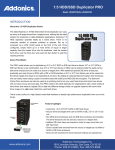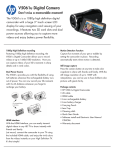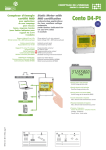Download LSI 72-Inch User's Manual
Transcript
72-Inch Cabinet Site Preparation and Installation Guide AA1167-E1, First Edition This document contains proprietary information of LSI Logic Corporation. The information contained herein is not to be used by or disclosed to third parties without the express written permission of an officer of LSI Logic Corporation. Any product(s) described herein is/are a licensed product of LSI Logic Corporation. Document AA1167-E1, First Edition. July 2001 This document describes the 72-inch style of LSI Logic Corporation’s 19-inch wide rackmount cabinet and will remain the official reference source for all revisions/releases of this product until rescinded by an update. It is the policy of LSI Logic to improve products as new technology, components, software, and firmware become available. LSI Logic Corporation reserves the right to make changes to any products herein at any time without notice. All features, functions, and operations described herein may not be marketed by LSI Logic in all parts of the world. In some instances, photographs and figures are of equipment prototypes. Therefore, before using this document, consult your LSI Logic representative for information that is applicable and current. LSI LOGIC DOES NOT ASSUME ANY RESPONSIBILITY OR LIABILITY FOR THE USE OF ANY PRODUCT(S) DESCRIBED HEREIN EXCEPT AS EXPRESSLY AGREED TO IN WRITING BY LSI LOGIC. The purchase or use of an LSI Logic product does not convey a license under any patent, copyright, trademark, or other intellectual property right of LSI Logic or third parties. Copyright © 2001. LSI Logic Corporation. All rights reserved. Trademark Acknowledgments LSI Logic and the LSI Logic logo are registered trademarks of LSI Logic Corporation. All other brand and product names may be trademarks of their respective companies. Federal Communications Commission (FCC) Radio Frequency Interference Statement This equipment has been tested and found to comply with the limits for a Class A digital device, pursuant to Part 15 of the FCC Rules. These limits are designed to provide reasonable protection against harmful interference in a commercial installation. This equipment generates, uses, and can radiate radio frequency energy and, if not installed and used in accordance with the instructions, may cause harmful interference to radio communications. Operation of this equipment in a residential area is likely to cause harmful interference, in which case the user will be required to correct the interference at his own expense. LSI Logic Corporation is not responsible for any radio or television interference caused by unauthorized modification of this equipment or the substitution or attachment of connecting cables and equipment other than those specified by LSI Logic Corporation. It is the user’s responsibility to correct interference caused by such unauthorized modification, substitution, or attachment. This Class A digital apparatus meets all requirements of the Canadian Interference-Causing Equipment Regulations. Cet appareil numérique de la classé A respecte toutes les exigences du Règlement sure le matèriel brouilleur du Canada. 72-Inch Cabinet Site Preparation and Installation Guide i Revision Record Revision Date First Edition July 2001 Affected Pages/Remarks First Printing Part Number: AA1167-E1 ii 72-Inch Cabinet Site Preparation and Installation Guide Contents About this Site Preparation Guide .................................................................................................. 1 Customer Responsibilities ......................................................................................................... 1 Cabinet Features .............................................................................................................................. 2 Reference Documentation ......................................................................................................... 4 Dimensions and Weights ................................................................................................................ 6 Dimensions ................................................................................................................................. 6 Weights ....................................................................................................................................... 7 Area Requirements .......................................................................................................................... 8 Environmental Requirements ......................................................................................................... 9 Power Requirements ..................................................................................................................... 10 AC Power Distribution ............................................................................................................ 11 Power Box Cables ..................................................................................................................... 12 Power Cords and Receptacles .................................................................................................. 13 Site Wiring and Power Considerations ................................................................................... 14 Installation Instructions ................................................................................................................ 15 Tools and Equipment .............................................................................................................. 15 Unpacking and Moving the Cabinet ....................................................................................... 16 Installing the Cabinet ............................................................................................................... 20 Transportation Instructions ......................................................................................................... 21 72-Inch Cabinet Site Preparation and Installation Guide iii List of Figures 1 72-inch Cabinet .............................................................................................................................2 2 72-inch Cabinet with Command and Drive Modules ................................................................3 3 Cabinet Dimensions ......................................................................................................................6 4 Cabinet Area Requirements ..........................................................................................................8 5 72-Inch Cabinet AC Distribution ..............................................................................................11 6 Ladder-Attach Cable for a 72-Inch Cabinet ..............................................................................12 7 AC Power Cords and Receptacles ..............................................................................................13 8 Unpacking Instructions for a 72-inch Cabinet without a Stability Foot .................................17 9 Unpacking Instructions for a 72-inch Cabinet with a Stability Foot .......................................18 10 Incorrect and Correct Methods for Pushing the Cabinet .......................................................19 iv 72-Inch Cabinet Site Preparation and Installation Guide List of Tables 1 Cabinet, Crate, and Module Weights .......................................................................................... 7 2 Environmental Requirements ...................................................................................................... 9 3 Power Requirements .................................................................................................................. 10 72-Inch Cabinet Site Preparation and Installation Guide v vi 72-Inch Cabinet Site Preparation and Installation Guide . . . . . . . . . . . . . . . . . . . . . . . . . . . . . . . . . . . . . . . . . . . . . . . . . . About this Site Preparation Guide About this Site Preparation Guide This document is intended for service technicians. It contains site preparation requirements and instructions for installing a 72-inch cabinet. This document also provides instructions for transporting the cabinet to another location. These instructions assume that the reader is knowledgeable in computer system operation, maintenance, and repair. Customer Responsibilities The following list describes some of the items and equipment you must provide, plus the facility preparations you must complete before installing a 72-inch high rackmount cabinet: • • Provide a site drawing that shows the location of the following: • Equipment currently installed at the site and the area designated for the 72-inch cabinet installation • • Existing site wiring (power, signal paths, and lengths) Equipment capable of generating electrical noise, electromagnetic interference, and heat Provide and install the following items: • Required communications cables, wall jacks, special connectors, and associated hardware • Necessary power distribution boxes, conduits, grounds, lightning protection, and associated hardware (see "Power Requirements" on page 10) • Required auxiliary power or other equipment • Make building alterations necessary to meet wiring, environmental, and other site requirements • Make sure all site construction, wiring, or other alterations meet applicable codes, regulations, and laws (including, but not limited to, electrical, building, safety, and health) • Provide necessary storage and service areas (see "Environmental Requirements" on page 9) • Provide floor coverings and environmental systems that limit or control electricity build-up and discharge 72-Inch Cabinet Site Preparation and Installation Guide 1 .............................................................................. Cabinet Features The rackmount cabinet (Figure 1) has a detachable back door and standard Electronic Industry Association (EIA) rails, which provide mounting holes for installing 19-inch wide devices. The cabinet has four roller casters and four adjustable guides for moving and leveling the cabinet during installation and relocation. Newer models of this cabinet have interface cable access holes on the top and a removable stability foot that prevents the cabinet from tipping when it is moved. Standard EIA Rails Cable Access Holes (not available on all models) Empty Cabinet Removable Stability Foot (not available on all models) Populated Cabinet Figure 1 72-inch Cabinet 2 72-Inch Cabinet Site Preparation and Installation Guide . . . . . . . . . . . . . . . . . . . . . . . . . . . . . . . . . . . . . . . . . . . . . . . . . . . . . . . . . . . . . . . Cabinet Features Depending upon performance, capacity, and availability requirements, you can customize the cabinet to meet your data storage needs. The cabinet contains two AC distribution boxes and can support up to twelve command modules and drive modules. The command module is a rackmount unit containing two array controllers, a battery, redundant cooling fans and power supplies. Drive modules may contain up to fourteen drives, redundant fans and power supplies, and either an array controller or Environmental Service Monitor (ESM) board. See "Reference Documentation" on page 4 for information on the modules. Figure 2 shows a typical configuration that includes five drive modules and one command module mounted in the 72-inch rackmount cabinet. The cabinet is shipped with only the bottom half filled to provide stability when shipping and moving the cabinet to the installation site. The top half is filled with blank panels. Figure 2 72-inch Cabinet with Command and Drive Modules 72-Inch Cabinet Site Preparation and Installation Guide 3 .............................................................................. Reference Documentation The following documents contain additional information on command and drive modules, their installation, and cabling schemes. These documents are listed chronological order from newest to oldest, based on the month and year they were released. 4 • Command Module and Drive Module Installation Guide, AP1154-E1, First Edition (March 2001) – provides information and step-by-step instructions for installing command modules (E3300, E4400, and E2400) and drive modules (E3300, FC-1 10x and FC-1 14x) running SANtricity Storage Manager 7.10 software • Command Module Site Preparation Guide, CC1151-E1, First Edition (March 2001) – provides information for preparing the building and equipment to install E3300 and E4400 Command Modules running SANtricity Storage Manager 7.10 software • Command Module User Guide, CC1140-E1, First Edition (March 2001) – provides information and step-by-step instructions for operating, upgrading, troubleshooting and servicing E3300 and E4400 Command Modules running SANtricity Storage Manager 7.10 software • Drive Module Site Preparation Guide, DF1153-E1, First Edition (March 2001) – provides information for preparing the building and equipment to install drive modules (E3300, FC-1 10x and FC-1 14x) and the E2400 Command Module running SANtricity Storage Manager 7.10 software • Drive Module User Guide, DF1144-E1, First Edition (March 2001)– provides information and step-by-step instructions for operating, upgrading, troubleshooting and servicing drive modules (E3300, FC-1 10x and FC-1 14x) and the E2400 Command Module running SANtricity Storage Manager 7.10 software • MetaStor E-Series, E4400 Command Module and E4400 Drive Module Installation Guide, AP1008-E1, First Edition (May 2000) – provides information and step-by-step instructions for installing E4400 command modules (4774) and E4400 Drive Modules (FC-FC ESM) running SANtricity Storage Manager 7.01 software • MetaStor E-Series, E4400 Command Module and E4400 Drive Module Site Preparation Guide, AP1010-E1, First Edition (May 2000) – provides information for preparing the building and equipment to install E4400 command modules (4774) and E4400 Drive Modules (FC-FC ESM) running SANtricity Storage Manager 7.01 software • MetaStor E-Series, E4400 Command Module User Guide, CC1012-E1, First Edition (May 2000) – provides information and step-by-step instructions for operating and servicing E4400 command modules (4774) running SANtricity Storage Manager 7.01 software • MetaStor E-Series, E4400 Drive Module User Guide, DF1014-E1, First Edition (May 2000) – provides information and step-by-step instructions for operating and servicing E4400 Drive Modules (FC-FC ESM) running SANtricity Storage Manager 7.01 software 72-Inch Cabinet Site Preparation and Installation Guide . . . . . . . . . . . . . . . . . . . . . . . . . . . . . . . . . . . . . . . . . . . . . . . . . . . . . . . . . . . . . . . Cabinet Features • MetaStor CM2000 Command Module Installation Guide, J90981S-0999, Revision B, Third Printing (March 2000) – provides information and step-by-step instructions for installing CM2000 Command Modules containing 4766 controllers and running SYMplicity Storage Manager (6.x) or SANtricity Storage Manager (7.00, 7.01, or 7.02) software • MetaStor CM2000 Command Module User Guide, J91981S-0999, Revision B, Third Printing (March 2000) – provides information and step-by-step instructions for operating, upgrading, troubleshooting and servicing CM2000 Command Modules containing 4766 controllers and running SYMplicity Storage Manager (6.x) or SANtricity Storage Manager (7.00, 7.01, or 7.02) software • MetaStor DM2000 Drive Module Installation Guide, J23971S-0899, Revision E, Third Printing (March 2000) – provides information and step-by-step instructions for installing DM2000 Command Modules containing LVD-SE or LVD-LVD Environmental Services Monitor (ESM) boards and running SYMplicity Storage Manager (6.x) or SANtricity Storage Manager (7.00, 7.01, or 7.02) software • MetaStor DM2000 Drive Module User Guide, J22971S-0899, Revision E, Third Printing (March 2000) – provides information and step-by-step instructions for operating, upgrading, troubleshooting and servicing DM2000 Command Modules containing LVD-LVD ESM boards and running SYMplicity Storage Manager (6.x) or SANtricity Storage Manager (7.00, 7.01, or 7.02) software • MetaStor Command Module System Guide, J20971S-0999, Revision B, Second Printing (March 2000) – provides information and step-by-step instructions for operating, upgrading, troubleshooting and servicing command modules containing 3621 or 3702 controllers and running SYMplicity Storage Manager 6.x software • MetaStor Command Module Installation Guide, J21971S-0398, Revision B, Second Printing (March 2000) – provides information and step-by-step instructions for installing command modules containing 3621 or 3702 controllers and running SYMplicity Storage Manager 6.x software 72-Inch Cabinet Site Preparation and Installation Guide 5 .............................................................................. Dimensions and Weights Dimensions The cabinet has the following dimensions (Figure 3), excluding the removable stability foot: • • • Height:183 cm (72 in.) Width: 56 cm (22 in.) Depth: 91 cm (36 in.) Figure 3 Cabinet Dimensions 6 72-Inch Cabinet Site Preparation and Installation Guide . . . . . . . . . . . . . . . . . . . . . . . . . . . . . . . . . . . . . . . . . . . . . . . . . . . . . . . . . Dimensions and Weights Weights The total weight depends on the type and quantity of modules installed in the 72-inch cabinet. Table 1 lists the overall weight of the cabinet, plus the maximum weights for the command and drive modules. You can use these weights to estimate the total weight of your system, based on the number of devices installed in the cabinet. Remember, the cabinets are shipped with only the bottom half filled with modules. If you order enough modules to fill the cabinet, they will be packed separately. In the United States and Canada, the cabinet and modules are shipped in a padded van. Internationally, the cabinet and modules are shipped in packing crates. Table 1 Cabinet, Crate, and Module Weights Unit Weight 1 2 Cabinet Crate1 Command Module Drive Module2 E4400 Command Module E4400 Drive Module Empty Empty Maximum Maximum Maximum Maximum 121.0 kg (267.0 lb) 97.0 kg (215.0 lb) 34.5 kg (76.0 lb) 39.3 kg (86.6 lb) 40.5 kg (89.0 lb) 40.0 kg (88.0 lb) Add for international shipments only Half-height drives 72-Inch Cabinet Site Preparation and Installation Guide 7 .............................................................................. Area Requirements The floor area at the installation site must provide: • Enough stability to support the weight of the 72-inch cabinet and installed devices (Table 1 on page 7) • • Sufficient space to install and service the cabinet and components (Figure 4) Sufficient ventilation to provide a free flow of air to the cabinet. Air flow in the cabinet is from the front to back. Figure 4 Cabinet Area Requirements 8 72-Inch Cabinet Site Preparation and Installation Guide . . . . . . . . . . . . . . . . . . . . . . . . . . . . . . . . . . . . . . . . . . . . . . . . . . . . . . Environmental Requirements Environmental Requirements Table 2 Environmental Requirements Environment Altitude Requirements Operating Range Storage Range Transit Range Below Sea Level 30.5 m (100 ft.) 30.5 m (100 ft.) 30.5 m (100 ft.) Above Sea Level 3000 m (9840 ft.) 3000 m (9840 ft.) 12,000 m (40,000 ft.) Operating Range Storage Range Transit Range Temperature Range 10° C to 35° C (50° F to 104° F) 15° C per hour (31° F per hour) 20° C per hour (42° F per hour) Temperature Change 10° C per hour (21° F per hour) 15° C per hour (31° F per hour) 20° C per hour (42° F per hour) Relative Humidity Operating Range Storage Range Transit Range 20% to 80% 10% to 90% 5% to 95% Temperature No Condensation Dew Point 28° C (82° F) Humidity Gradient 10% per hour Noise Steady/Non-Steady Normal Operation 6.8 bels 65 dBA Level Component Configuration A Configuration B Configuration C LP Drives 1.62 kVA 1601 W 5467 Btu/hr 3.23 kVA 3202 W 10,934 Btu/hr 2.90 kVA 2866 W 9788 Btu/hr HH Drives 1.69 kVA 1677 W 5727 Btu/hr 3.39 kVA 3354 W 11,454 Btu/hr 3.02 kVA 2988 W 10,205 Btu/hr Heat Dissipation1 1 Maximum Allowed These are kVA, W, and Btu calculations for three configurations containing Low-Profile (LP) and Half-Height (HH) drives, including: Configuration A contains 1 command module and 5 drive modules Configuration B contains 2 command modules and 10 drive modules Configuration C contains 3 command modules and 8 drive modules 72-Inch Cabinet Site Preparation and Installation Guide 9 .............................................................................. Power Requirements Table 3 Power Requirements Unit/Component Requirements Domestic International AC Power 250 VAC, 30 A 230 VAC, 32 A AC Plug NEMA L6-30P, locking plug IEC 309 locking plug Receptacle 6-30R, receptacle IEC 309 receptacle Circuit Breaker 20 A Voltage Range 180 to 257 VAC Frequency 49 to 50.5 Hz or 59 to 60.6 Hz Current (specified frequency) 220 VAC, 50/60 Hz Configuration A1 Configuration B1 Configuration C1 LP Drives2 7.35 A 14.70 A 13.16 A HH Drives2 7.70 A 15.40 A 13.72 A LP Drives 10.95 A 21.90 A 22.20 A HH Drives 11.45 A 22.90 A 23.00 A Operational Current Surge Current 1 Power specifications for three configurations containing Low-Profile (LP) and Half-Height (HH) drives, including: Configuration A contains 1 command module and 5 drive modules Configuration B contains 2 command modules and 10 drive modules Configuration C contains 3 command modules and 8 drive modules 2 LP drives are 1.0 inch tall; HH drives are 1.6 inches tall. 10 72-Inch Cabinet Site Preparation and Installation Guide . . . . . . . . . . . . . . . . . . . . . . . . . . . . . . . . . . . . . . . . . . . . . . . . . . . . . . . . . . . . Power Requirements AC Power Distribution The 72-inch cabinet has two identical AC power boxes (Figure 5). Depending on the configuration ordered, each box supports either domestic or international units and includes the following features: • One domestic plug (NEMA L6-30P, 30 A, 220 VAC) or one international plug (IEC 309, 30 A, 3-pin, 230 VAC) • • One circuit breaker (20 A) • Support for up to 12 attachments per box (24 per cabinet) using two, ladder-attach cables (see "Power Box Cables" on page 12) Two power outlets (IEC 320, 16 A, C-19, filtered individually for international and domestic EMC compliance) Figure 5 72-Inch Cabinet AC Distribution 72-Inch Cabinet Site Preparation and Installation Guide 11 .............................................................................. Power Box Cables Each AC box outlet supports on ladder-attach power cable (Figure 6) that you can connect to a maximum of six devices. You may connect up to twelve 220/230 VAC devices to each AC box for a maximum of twenty-four power attachments inside the cabinet. Although the cabinet may not be fully populated when shipped, the 72-inch cabinet is shipped with four, ladder-attach cables for easier expansion in the future. Each cable has the following specifications: • • • • • Cable: 10 A per cable (1.67 A per connection if all are used) Input Connector: IEC 320, C-19, 16 A, 250 VAC Plugs: IEC 320, C-14, 10 A, 250 VAC Ladder Step: 5.25 inches between connections Cable Routing: Route cables between the mounting rails and side skins of cabinet Figure 6 Ladder-Attach Cable for a 72-Inch Cabinet 12 72-Inch Cabinet Site Preparation and Installation Guide . . . . . . . . . . . . . . . . . . . . . . . . . . . . . . . . . . . . . . . . . . . . . . . . . . . . . . . . . . . . Power Requirements Power Cords and Receptacles The cabinet is shipped with two power cords: one for domestic use, the other for international use. Each cord connects to an independent 24 A circuit breaker and an AC distribution box. The AC distribution box has two outlets for connecting the power cords from devices installed in the cabinet. Figure 7 shows these receptacles. 250 VAC, 16 A, IEC 320-C19 Cord To device in cabinet AC Distribution Box Outlet 250 VAC, 30 A, NEMA L6-30 Cord (Domestic) 230 VAC, 32 A, IEC 309 Cord (International) Figure 7 AC Power Cords and Receptacles 72-Inch Cabinet Site Preparation and Installation Guide 13 .............................................................................. Site Wiring and Power Considerations The cabinet’s AC distribution boxes use common industrial wiring. Consider the following site wiring and power source requirements: • AC power source. The AC power source must provide the correct voltage, current, and frequency specified on the manufacturer’s name plate. • Earth ground. You must have an earth grounding conductor to the cabinet’s power receptacles. • Circuit overloading. Make sure the power circuits and associated circuit breakers provide sufficient power and overload protection. To prevent possible damage to the AC distribution boxes and other components in the cabinet, isolate its power source from large switching loads (such as air conditioning motors, elevator motors, and factory loads). • Module power distribution. There are two accessory outlets inside the cabinet for module power distribution. All units attached to these outlets must be auto-ranging between 180 through 257 VAC, 50-60 Hz. • Power Interruptions. The 72-inch cabinet and its modules will withstand the following applied voltage interruptions (with or without an integrated UPS): • • • • 14 Input transient: 50% of nominal voltage Duration: one half cycle Maximum frequency: once every ten seconds Power Failures. After total power failure, the modules within the cabinet will automatically perform a power-up recovery without operator intervention, once power is restored. 72-Inch Cabinet Site Preparation and Installation Guide . . . . . . . . . . . . . . . . . . . . . . . . . . . . . . . . . . . . . . . . . . . . . . . . . . . . . . . . . . . Installation Instructions Installation Instructions Tools and Equipment You will need the following tools and equipment to unpack and install a 72-inch cabinet: • • • • Wrench (supplied in shipping crate) – to raise and lower the leveling glides Shears – to cut the metal bands on the shipping crate Forklift (optional) – to remove the cabinet from the shipping skid Communication cables (optional)– additional cables to attach the cabinet to the host 72-Inch Cabinet Site Preparation and Installation Guide 15 .............................................................................. Unpacking and Moving the Cabinet WARNING Risk of bodily injury! The cabinet can weigh up to 636 kg (1420 lb) fully loaded. Do not attempt to move the cabinet without a forklift or sufficient help from others. Always push the cabinet from the front to prevent it from tipping over (Figure 10). If you need to move the cabinet up or down a ramp (with or without a forklift), remove drive modules from the upper half of the cabinet to improve stability. CAUTION If you receive the cabinet and modules in extremely cold weather (below 32° F), leave them crated for at least 24 hours to prevent condensation. This 24-hour stabilization period can be modified either up or down, depending on the outside temperature at arrival. The shipping crate provides built-in ramps and instructions for rolling the cabinet off of the skid without the use of a forklift. Some models have a removable stability foot that prevents the cabinet from tipping over when it is moved. You must attach the stability foot to the front of the cabinet (at the bottom) before you move the cabinet. Figure 8 on page 17 shows the unpacking instructions included on the front side of the shipping crate for cabinets without a stability foot. Figure 9 on page 18 shows unpacking instructions for cabinets with a stability foot. Figure 10 on page 19 shows the incorrect and correct methods for moving the cabinet. For your safety, follow all these instructions carefully. 16 72-Inch Cabinet Site Preparation and Installation Guide . . . . . . . . . . . . . . . . . . . . . . . . . . . . . . . . . . . . . . . . . . . . . . . . . . . . . . . . . . . Installation Instructions Figure 8 Unpacking Instructions for a 72-inch Cabinet without a Stability Foot 72-Inch Cabinet Site Preparation and Installation Guide 17 .............................................................................. Figure 9 Unpacking Instructions for a 72-inch Cabinet with a Stability Foot 18 72-Inch Cabinet Site Preparation and Installation Guide . . . . . . . . . . . . . . . . . . . . . . . . . . . . . . . . . . . . . . . . . . . . . . . . . . . . . . . . . . . Installation Instructions Cabinet without Stability Foot Cabinet with Stability Foot Figure 10 Incorrect and Correct Methods for Pushing the Cabinet 72-Inch Cabinet Site Preparation and Installation Guide 19 .............................................................................. Installing the Cabinet The installation tasks you must perform depends on how you ordered the 72-inch cabinet and its associated modules. In most cases, you will need to do some or all of the following: 1 Check the shipping contents list to make sure all equipment arrived at the site. 2 Move the cabinet to its final location. Once it is in position, lower the levelling glides and level the unit as necessary. 3 Install all applicable host, host adapter boards, hubs, switches, and other devices on the network. Route the appropriate interface cables to the cabinet. 4 Route the main power cords from the cabinet to the external power source (but do not plug in yet). 5 If necessary, install applicable mounting hardware for rackmount units. Refer to kit instructions. 6 Install all devices in cabinet (command modules, drive modules, etc.) Refer to applicable installation instructions for each device. 7 Route and connect appropriate interface and power cables to devices in cabinet. 8 Plug in main power cord to cabinet and turn on power. Make sure that you power-up all devices in the proper sequence. 9 Test all devices in the cabinet and on the SCSI bus or Fibre Channel network for error free operation. 10 Install software and configure the drive modules and controller modules as necessary. For installation and operation information on individual modules , software, or other network components, refer to the user manuals shipped with each unit. 20 72-Inch Cabinet Site Preparation and Installation Guide . . . . . . . . . . . . . . . . . . . . . . . . . . . . . . . . . . . . . . . . . . . . . . . . . . . . . . . . Transportation Instructions Transportation Instructions WARNING Risk of bodily harm. Failure to follow this procedure could result in a cabinet becoming very unstable up/down inclines or over uneven surfaces. To maximize stability during the transportation of a 72-inch cabinet, the center of gravity for the cabinet must be as close to the base as possible. For this reason, it is recommended that you transport the unit with the upper half of the modules depopulated. All heavier weighted components in the upper half of the cabinet should be taken out and transported by static protective means. This includes drives, battery canisters, and controllers. It is not necessary to remove components in the rear of the modules, such as power supplies. These components will not disturb an optimal center of gravity. If the original shipping boxes are available, these may serve as ideal transportation for these components. Here are some guidelines to follow: • Make note of the Tray ID settings for the drive modules. It is imperative that the drives be replaced in the exact slots from which they were removed. Make sure the drives are in the same order during shipping and that the drives have been associated with the proper Tray ID. • If any cables need to be disconnected, note the cable configuration for future assembly. The module’s user guide will help by providing cabling diagrams. • • Keep all components from the same modules together. All components must be replaced to the same module and location. This will avoid conflicts and data loss. 72-Inch Cabinet Site Preparation and Installation Guide 21 .............................................................................. 22 72-Inch Cabinet Site Preparation and Installation Guide






























